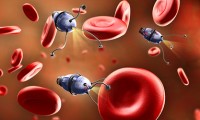-
Smartphone Based Diagnosis to Identify Mosquitoes Transmitting Infection
- Source: The Verdict
- 1,158
- September 5, 2018
-
3D Human Liver Implant – The Need of the Hour
- Source: MedicalXpress
- 1,132
- August 29, 2018
-
IACS – An Advanced Cell Sorter
- Source: drugdu
- 1,123
- August 29, 2018
-
Wearable Medical Devices, Your Constant Healthcare Companion
- Source: Ddu
- 1,558
- August 28, 2018
-
Nanobot Pumps can Treat Neurological Damage
- Source: The Verdict
- 1,176
- August 28, 2018
-
FDA Grants Approval for Brainsway’s OCD-Treating TMS System
- Source: Mass Device
- 1,749
- August 22, 2018
-
Five Top Medical Device Start-Ups
- Source: The Verdict
- 1,808
- August 21, 2018
-
Novel Imaging Technique to Diagnose Tuberculosis Within An Hour
- Source: The Verdict
- 1,085
- August 21, 2018
-
Self-Compositioning Scaffold Enhances Bone Injury Repair
- Source: The Verdict
- 922
- August 20, 2018
-
Deep Learning used by Johns Hopkins Researchers to detect Pancreatic Cancer Early
- Source: Healthcare IT News
- 1,394
- August 20, 2018
your submission has already been received.
OK
Subscribe
Please enter a valid Email address!
Submit
The most relevant industry news & insight will be sent to you every two weeks.













